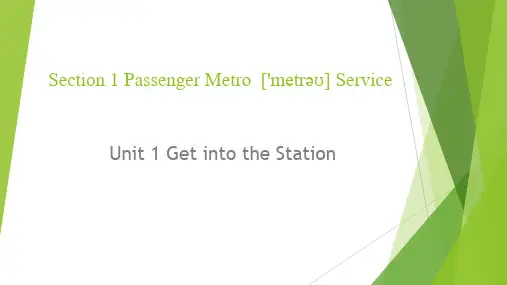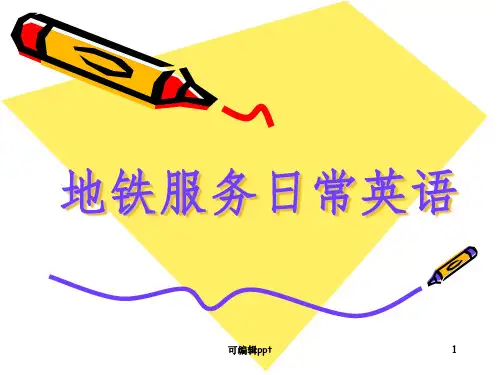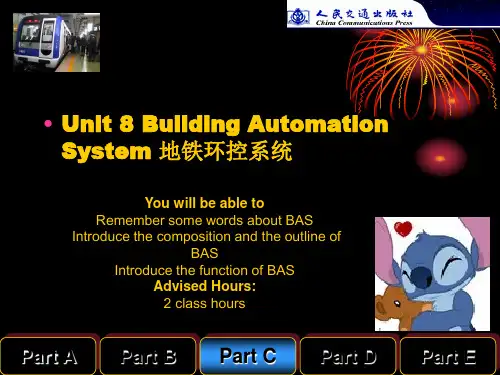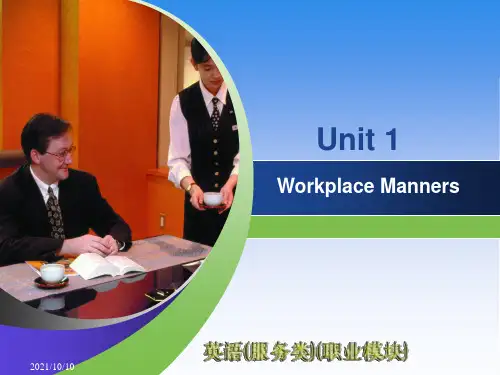地铁客运服务英语课件Unit 1
- 格式:ppt
- 大小:1.70 MB
- 文档页数:16
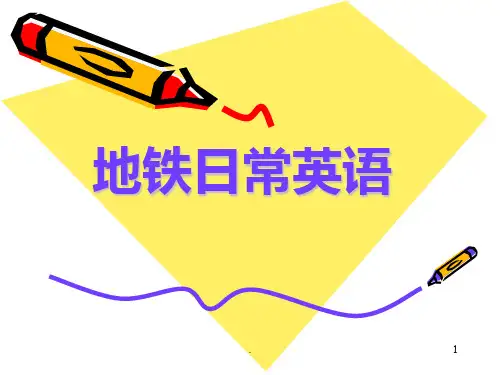
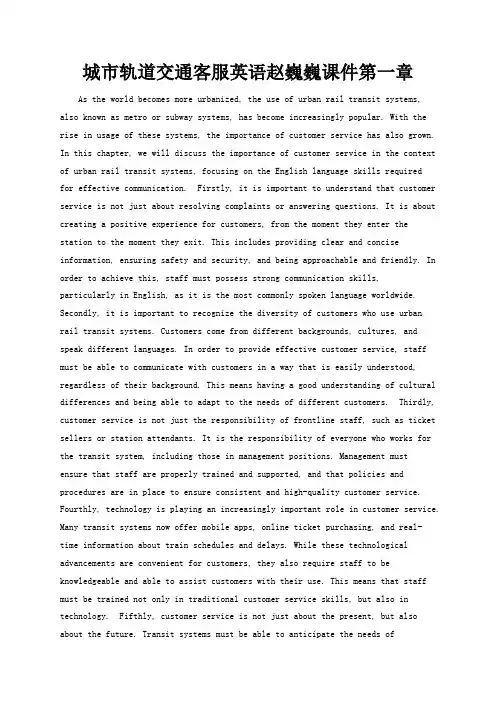
城市轨道交通客服英语赵巍巍课件第一章As the world becomes more urbanized, the use of urban rail transit systems, also known as metro or subway systems, has become increasingly popular. With the rise in usage of these systems, the importance of customer service has also grown. In this chapter, we will discuss the importance of customer service in the context of urban rail transit systems, focusing on the English language skills requiredfor effective communication. Firstly, it is important to understand that customer service is not just about resolving complaints or answering questions. It is about creating a positive experience for customers, from the moment they enter thestation to the moment they exit. This includes providing clear and concise information, ensuring safety and security, and being approachable and friendly. In order to achieve this, staff must possess strong communication skills,particularly in English, as it is the most commonly spoken language worldwide. Secondly, it is important to recognize the diversity of customers who use urbanrail transit systems. Customers come from different backgrounds, cultures, and speak different languages. In order to provide effective customer service, staff must be able to communicate with customers in a way that is easily understood, regardless of their background. This means having a good understanding of cultural differences and being able to adapt to the needs of different customers. Thirdly, customer service is not just the responsibility of frontline staff, such as ticket sellers or station attendants. It is the responsibility of everyone who works for the transit system, including those in management positions. Management mustensure that staff are properly trained and supported, and that policies and procedures are in place to ensure consistent and high-quality customer service. Fourthly, technology is playing an increasingly important role in customer service. Many transit systems now offer mobile apps, online ticket purchasing, and real-time information about train schedules and delays. While these technological advancements are convenient for customers, they also require staff to be knowledgeable and able to assist customers with their use. This means that staff must be trained not only in traditional customer service skills, but also in technology. Fifthly, customer service is not just about the present, but also about the future. Transit systems must be able to anticipate the needs ofcustomers and adapt to changing trends and technologies. This means investing in research and development, and being open to feedback from customers. By doing so, transit systems can continue to provide high-quality customer service and remain competitive in the market. In conclusion, customer service is a crucial aspect of urban rail transit systems. Effective communication skills, particularly in English, are essential for providing high-quality customer service. Staff must be able to communicate effectively with customers from diverse backgrounds, and management must ensure that staff are properly trained and supported. Technological advancements are also changing the way customer service is provided, and transit systems must be able to adapt to these changes. By prioritizing customer service, transit systems can create a positive experience for customers and remain competitive in the market.。

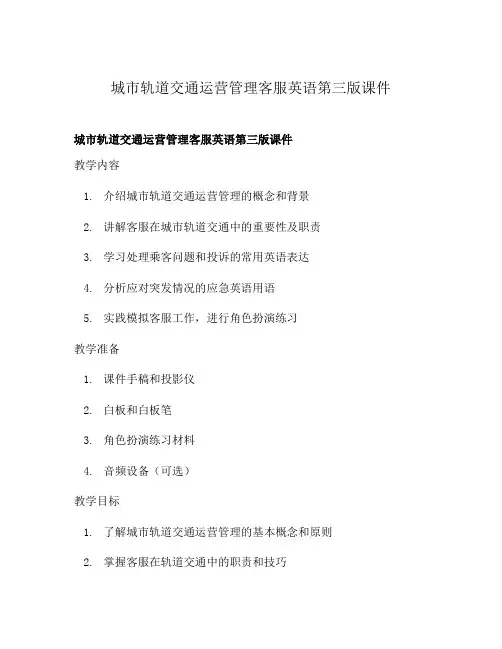
城市轨道交通运营管理客服英语第三版课件城市轨道交通运营管理客服英语第三版课件教学内容1.介绍城市轨道交通运营管理的概念和背景2.讲解客服在城市轨道交通中的重要性及职责3.学习处理乘客问题和投诉的常用英语表达4.分析应对突发情况的应急英语用语5.实践模拟客服工作,进行角色扮演练习教学准备1.课件手稿和投影仪2.白板和白板笔3.角色扮演练习材料4.音频设备(可选)教学目标1.了解城市轨道交通运营管理的基本概念和原则2.掌握客服在轨道交通中的职责和技巧3.学会运用英语表达处理乘客问题和投诉4.熟悉应对突发情况的应急英语用语5.提高沟通和解决问题的能力设计说明1.通过理论讲解和实践练习相结合的方式进行教学2.利用角色扮演练习让学生亲身体验客服工作3.引入真实案例和故事,增加学习的趣味性和实际性4.创造积极互动的氛围,鼓励学生多参与讨论和提问教学过程1.引入(10分钟)–介绍城市轨道交通运营管理的背景和现状–引发学生对客服工作的兴趣和重要性2.理论讲解(20分钟)–客服在轨道交通中的职责和技巧–处理乘客问题和投诉的常用英语表达–应对突发情况的应急英语用语3.角色扮演练习(30分钟)–分发角色扮演材料,让学生扮演轨道交通客服人员和乘客–实践处理乘客问题和投诉的情景–提供反馈和建议,鼓励学生改进表达和解决问题的能力4.案例分享与讨论(15分钟)–分享真实案例和故事,讨论客服在应对突发情况中的经验和策略–学生分享自己的观点和建议5.小结(5分钟)–总结课程内容和重点–强调学生在实践中的进步和改进的空间课后反思1.检查学生的理解和掌握情况,根据实际情况调整教学方法和内容2.回顾课程中存在的问题和改进的空间,保持不断提升教学质量的态度3.鼓励学生在实践中继续提高沟通和解决问题的能力4.提供相关参考资料和练习题,帮助学生进一步巩固所学知识和技能。
城市轨道交通运营管理客服英语第三版课件(续)教学内容1.介绍城市轨道交通运营管理的概念和背景2.讲解客服在城市轨道交通中的重要性及职责3.学习处理乘客问题和投诉的常用英语表达4.分析应对突发情况的应急英语用语5.实践模拟客服工作,进行角色扮演练习6.提供相关参考资料和练习题,巩固所学知识和技能教学准备1.课件手稿和投影仪2.白板和白板笔3.角色扮演练习材料4.音频设备(可选)5.相关参考资料和练习题的复印件教学目标1.了解城市轨道交通运营管理的基本概念和原则2.掌握客服在轨道交通中的职责和技巧3.学会运用英语表达处理乘客问题和投诉4.熟悉应对突发情况的应急英语用语5.提高沟通和解决问题的能力6.巩固所学知识和技能,提高在实践中的应用能力设计说明1.通过理论讲解和实践练习相结合的方式进行教学2.利用角色扮演练习让学生亲身体验客服工作3.引入真实案例和故事,增加学习的趣味性和实际性4.创造积极互动的氛围,鼓励学生多参与讨论和提问5.提供相关参考资料和练习题,巩固学生在课后的学习效果教学过程1.引入(10分钟)–介绍城市轨道交通运营管理的背景和现状–引发学生对客服工作的兴趣和重要性2.理论讲解(20分钟)–客服在轨道交通中的职责和技巧–处理乘客问题和投诉的常用英语表达–应对突发情况的应急英语用语3.角色扮演练习(30分钟)–分发角色扮演材料,让学生扮演轨道交通客服人员和乘客–实践处理乘客问题和投诉的情景–提供反馈和建议,鼓励学生改进表达和解决问题的能力4.案例分享与讨论(15分钟)–分享真实案例和故事,讨论客服在应对突发情况中的经验和策略–学生分享自己的观点和建议5.小结(5分钟)–总结课程内容和重点–强调学生在实践中的进步和改进的空间6.课后巩固(持续至课堂结束)–提供相关参考资料和练习题,供学生在课后巩固所学知识和技能–鼓励学生根据实际情况进行实践,并提供反馈和答疑支持课后反思1.检查学生的理解和掌握情况,根据实际情况调整教学方法和内容2.回顾课程中存在的问题和改进的空间,保持不断提升教学质量的态度3.鼓励学生在实践中继续提高沟通和解决问题的能力4.提供相关参考资料和练习题,帮助学生进一步巩固所学知识和技能。

